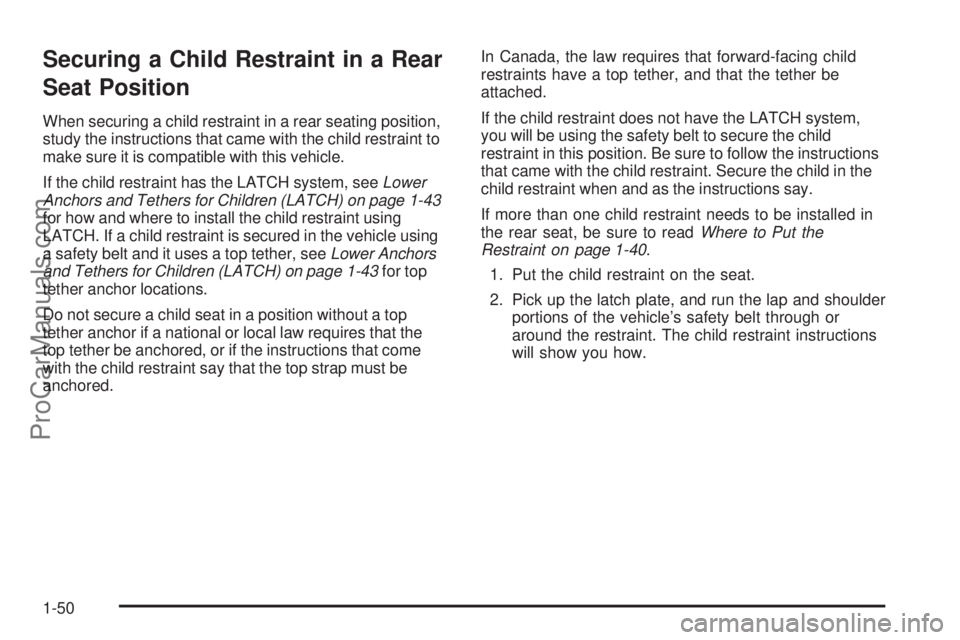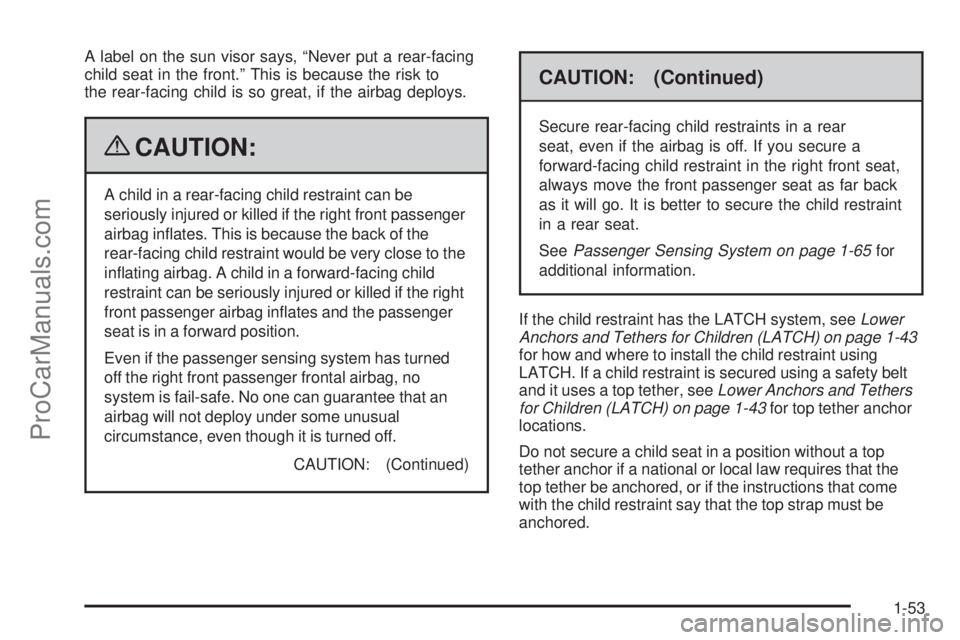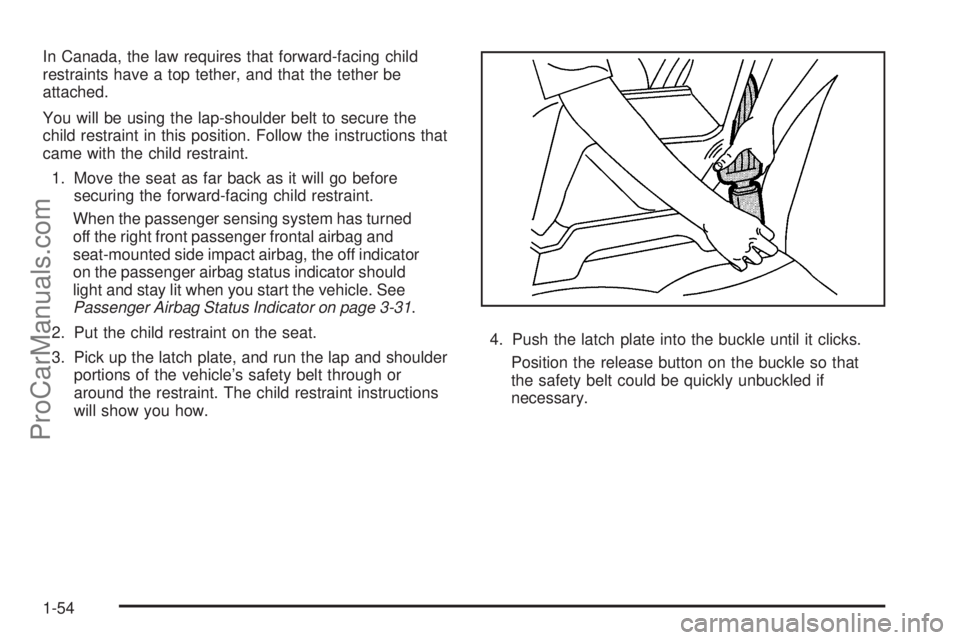Page 52 of 408

This system is designed to make installation of child
restraints easier. When using lower anchors, do not use
the vehicle’s safety belts. Instead use the vehicle’s
anchors and child restraint attachments to secure the
restraints. Some restraints also use another vehicle
anchor to secure a top tether.
1. Attach and tighten the lower attachments to the
lower anchors. If the child restraint does not have
lower attachments or the desired seating position
does not have lower anchors, secure the child
restraint with the top tether and the safety belts.
Refer to your child restraint manufacturer
instructions and the instructions in this manual.
1.1. Find the lower anchors for the desired
seating position.
1.2. Put the child restraint on the seat.
1.3. Attach and tighten the lower attachments on
the child restraint to the lower anchors.2. If the child restraint manufacturer recommends that
the top tether be attached, attach and tighten the
top tether to the top tether anchor, if equipped.
Refer to the child restraint instructions and the
following steps:
2.1. Find the top tether anchor.
2.2. If the position you are using has an
adjustable headrest or head restraint, raise it.
SeeHead Restraints on page 1-7.
2.3. Route, attach, and tighten the top tether
according to the child restraint instructions
and the following instructions:
If the position you are using
does not have a headrest
or head restraint and you
are using a single tether,
route the tether over the
seatback.
1-48
ProCarManuals.com
Page 53 of 408
If the position you are using
does not have a headrest
or head restraint and you
are using a dual tether,
route the tether over the
seatback.
If the position you are using
has an adjustable headrest
or head restraint and you
are using a single tether,
route the tether under the
headrest or head restraint
and in between the
headrest or head restraint
posts. SeeHead Restraints
on page 1-7.If the position you are using
has an adjustable headrest
or head restraint and you
are using a dual tether
route the tether under the
headrest or head restraint
and in between the
headrest or head restraint
posts. SeeHead Restraints
on page 1-7.
3. Push and pull the child restraint in different
directions to be sure it is secure.
1-49
ProCarManuals.com
Page 54 of 408

Securing a Child Restraint in a Rear
Seat Position
When securing a child restraint in a rear seating position,
study the instructions that came with the child restraint to
make sure it is compatible with this vehicle.
If the child restraint has the LATCH system, seeLower
Anchors and Tethers for Children (LATCH) on page 1-43
for how and where to install the child restraint using
LATCH. If a child restraint is secured in the vehicle using
a safety belt and it uses a top tether, seeLower Anchors
and Tethers for Children (LATCH) on page 1-43for top
tether anchor locations.
Do not secure a child seat in a position without a top
tether anchor if a national or local law requires that the
top tether be anchored, or if the instructions that come
with the child restraint say that the top strap must be
anchored.In Canada, the law requires that forward-facing child
restraints have a top tether, and that the tether be
attached.
If the child restraint does not have the LATCH system,
you will be using the safety belt to secure the child
restraint in this position. Be sure to follow the instructions
that came with the child restraint. Secure the child in the
child restraint when and as the instructions say.
If more than one child restraint needs to be installed in
the rear seat, be sure to readWhere to Put the
Restraint on page 1-40.
1. Put the child restraint on the seat.
2. Pick up the latch plate, and run the lap and shoulder
portions of the vehicle’s safety belt through or
around the restraint. The child restraint instructions
will show you how.
1-50
ProCarManuals.com
Page 56 of 408

5. To tighten the belt, push down on the child restraint,
pull the shoulder portion of the belt to tighten the lap
portion of the belt and feed the shoulder belt back
into the retractor. When installing a forward-facing
child restraint, it may be helpful to use your knee
to push down on the child restraint as you tighten
the belt.6. If the child restraint has a top tether, follow the child
restraint manufacturer’s instructions regarding the
use of the top tether. SeeLower Anchors and
Tethers for Children (LATCH) on page 1-43for more
information.
7. Push and pull the child restraint in different
directions to be sure it is secure.
To remove the child restraint, unbuckle the vehicle safety
belt and let it return to the stowed position. If the top
tether is attached to a top tether anchor, disconnect it.
Securing a Child Restraint in the
Right Front Seat Position
This vehicle has airbags. A rear seat is a safer place to
secure a forward-facing child restraint. SeeWhere to
Put the Restraint on page 1-40.
In addition, the vehicle has a passenger sensing system
which is designed to turn off the right front passenger
frontal airbag and seat-mounted side impact airbag
under certain conditions. SeePassenger Sensing
System on page 1-65andPassenger Airbag Status
Indicator on page 3-31for more information, including
important safety information.
1-52
ProCarManuals.com
Page 57 of 408

A label on the sun visor says, “Never put a rear-facing
child seat in the front.” This is because the risk to
the rear-facing child is so great, if the airbag deploys.
{CAUTION:
A child in a rear-facing child restraint can be
seriously injured or killed if the right front passenger
airbag in�ates. This is because the back of the
rear-facing child restraint would be very close to the
in�ating airbag. A child in a forward-facing child
restraint can be seriously injured or killed if the right
front passenger airbag in�ates and the passenger
seat is in a forward position.
Even if the passenger sensing system has turned
off the right front passenger frontal airbag, no
system is fail-safe. No one can guarantee that an
airbag will not deploy under some unusual
circumstance, even though it is turned off.
CAUTION: (Continued)
CAUTION: (Continued)
Secure rear-facing child restraints in a rear
seat, even if the airbag is off. If you secure a
forward-facing child restraint in the right front seat,
always move the front passenger seat as far back
as it will go. It is better to secure the child restraint
in a rear seat.
SeePassenger Sensing System on page 1-65for
additional information.
If the child restraint has the LATCH system, seeLower
Anchors and Tethers for Children (LATCH) on page 1-43
for how and where to install the child restraint using
LATCH. If a child restraint is secured using a safety belt
and it uses a top tether, seeLower Anchors and Tethers
for Children (LATCH) on page 1-43for top tether anchor
locations.
Do not secure a child seat in a position without a top
tether anchor if a national or local law requires that the
top tether be anchored, or if the instructions that come
with the child restraint say that the top strap must be
anchored.
1-53
ProCarManuals.com
Page 58 of 408

In Canada, the law requires that forward-facing child
restraints have a top tether, and that the tether be
attached.
You will be using the lap-shoulder belt to secure the
child restraint in this position. Follow the instructions that
came with the child restraint.
1. Move the seat as far back as it will go before
securing the forward-facing child restraint.
When the passenger sensing system has turned
off the right front passenger frontal airbag and
seat-mounted side impact airbag, the off indicator
on the passenger airbag status indicator should
light and stay lit when you start the vehicle. See
Passenger Airbag Status Indicator on page 3-31.
2. Put the child restraint on the seat.
3. Pick up the latch plate, and run the lap and shoulder
portions of the vehicle’s safety belt through or
around the restraint. The child restraint instructions
will show you how.4. Push the latch plate into the buckle until it clicks.
Position the release button on the buckle so that
the safety belt could be quickly unbuckled if
necessary.
1-54
ProCarManuals.com
Page 59 of 408
5. Pull the rest of the shoulder belt all the way out of
the retractor to set the lock.6. To tighten the belt, push down on the child restraint,
pull the shoulder portion of the belt to tighten the lap
portion of the belt and feed the shoulder belt back
into the retractor. When installing a forward-facing
child restraint, it may be helpful to use your knee
to push down on the child restraint as you tighten
the belt.
7. Push and pull the child restraint in different
directions to be sure it is secure.
If the airbags are off, the off indicator in the passenger
airbag status indicator will come on and stay on when the
vehicle is started.
1-55
ProCarManuals.com
Page 62 of 408
{CAUTION:
Children who are up against, or very close to, any
airbag when it in�ates can be seriously injured or
killed. Airbags plus lap-shoulder belts offer
protection for adults and older children, but not for
young children and infants. Neither the vehicle’s
safety belt system nor its airbag system is designed
for them. Young children and infants need the
protection that a child restraint system can provide.
Always secure children properly in your vehicle.
To read how, seeOlder Children on page 1-30or
Infants and Young Children on page 1-33.There is an airbag readiness light on the instrument
panel cluster, which shows the airbag symbol.
The system checks the airbag electrical system for
malfunctions. The light tells you if there is an electrical
problem. SeeAirbag Readiness Light on page 3-30
for more information.
1-58
ProCarManuals.com